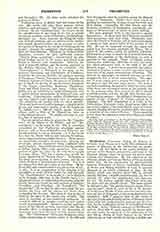

Prudentius (GALINDO), Bishop of Troyes, b. in Spain; d. at Troyes on April 6, 861; celebrated opponent of Hincmar in the controversy on predestination. He left Spain in his youth, probably on account of the Saracen persecution, and came to the Frankish Empire where he changed his native name Galindo into Prudentius. He was educated at the Palatine school, and became Bishop of Troyes shortly before 847. In the controversy on predestination between Gottschalc of Orbais, Archbishop Hincmar of Reims, and Bishop Pardulus of Laon, he opposed Hincmar in an epistle addressed to him. In this epistle, which was written about 849, he defends against Hincmar a double predestination, viz. one for reward, the other for punishment not, however, for sin. He further upholds that Christ died only for those who are actually saved. The same opinion he defends in his “De praedestinatione contra Johannem Scotum”, which he wrote in 851 at the instance of Archbishop Wenilo of Sens who had sent him nineteen articles of Eriugena’s work on predestination for refutation. Still it appears that at the synod of Quierzy, he subscribed to four articles of Hincmar which admit only one predestination, perhaps out of reverence for the archbishop, or out of fear of King Charles the Bald. In his “Epistola tractoria ad Wenilonem”, written about 856, he again upholds his former opinion and makes his approval of the ordination of the new bishop Aeneas of Paris depend on the latter s subscription to four articles favoring a double predestination. Of great historical value is his continuation of the “Annales Bertiniani” from 835-61, in which he presents a reliable history of that period of the Western Frankish Empire. He is also the author of “Vita Sanctae Maurae Virginis” (Acta SS. September VI, 275-8) and some poems. At Troyes his feast is celebrated on April 6 as that of a saint, though the Bollandists do not recognize his cult (Acta SS. April I, 531). His works, with the exception of his poems, are printed in P.L., CXV, 971-1458; his poems in Mon. Germ. Poetae Lat., II, 679 sq.
MICHAEL OTT

